Luxurious Bathing:
| (Fourth Edition) A SKETCH BY ANDREW W. TUER: 1880. |
 Shadows in the pond. |
EIGHT ETCHINGS BY TRISTRAM ELLIS. 5⁄− |
| London: Field & Tuer, Ye Leadenhalle Presse, E.C. |
New York: Scribner & Welford, 743 & 745, Broadway. |
The Project Gutenberg EBook of Luxurious Bathing, by Andrew W. Tuer This eBook is for the use of anyone anywhere in the United States and most other parts of the world at no cost and with almost no restrictions whatsoever. You may copy it, give it away or re-use it under the terms of the Project Gutenberg License included with this eBook or online at www.gutenberg.org. If you are not located in the United States, you'll have to check the laws of the country where you are located before using this ebook. Title: Luxurious Bathing Author: Andrew W. Tuer Illustrator: Tristram Ellis Release Date: June 30, 2020 [EBook #62531] Language: English Character set encoding: UTF-8 *** START OF THIS PROJECT GUTENBERG EBOOK LUXURIOUS BATHING *** Produced by Richard Tonsing, Chris Curnow, and the Online Distributed Proofreading Team at https://www.pgdp.net (This file was produced from images generously made available by The Internet Archive)
Transcriber’s Note:
The cover image was created by the transcriber and is placed in the public domain.
| (Fourth Edition) A SKETCH BY ANDREW W. TUER: 1880. |
 Shadows in the pond. |
EIGHT ETCHINGS BY TRISTRAM ELLIS. 5⁄− |
| London: Field & Tuer, Ye Leadenhalle Presse, E.C. |
New York: Scribner & Welford, 743 & 745, Broadway. |
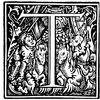
Treatises and disquisitions sufficient to form a library of no inconsiderable dimensions have been written during the last three centuries on the subject of baths: boiling, freezing, variously medicated—including tar-water, steam, and spray; milk, whey, broth, mud, sand, and even earth-baths—in which the patient for hours together was buried up to his neck in a 2fallow field—have all had their exponents and upholders; then there is the vapour-bath of the Russian, the dry, hot air or Turkish-bath, besides the cold air-bath recommended by Franklin, and those who like it may follow the example of the elder Pliny who used to indulge in a bath of sunshine. Now-a-days it is a common practice, on the shores of the Mediterranean, for many of the inhabitants, during the hot months, to pass a considerable portion of their time sitting on chairs placed a few feet from the shore, the calm water, without even the nuance of a ripple, reaching to the neck, while the head is protected from the scorching sun by an immense grass hat.
3The inference may be too hastily drawn that what is advocated in this Sketch is unnecessary, being simply what everyone now-a-days practises in one form or another—cleanliness; on consideration, however, this will be found to be hardly the fact. We are a cleanly nation, or at any rate more cleanly than we were, but bathing with hot or cold water as ordinarily practised is not so enjoyable and luxurious as it might be, and moreover, to the weakly, is often harmful in its action.
Perhaps the very acme of luxurious bathing is reached in the Soap-bath, an application of hot water and soap to 4the whole body, followed immediately by a cold plunge, or a sponge-bath. A bath is at once a necessity and a luxury, and in order to obtain the greatest number of benefits, including increased health, appetite, vigour, and good spirits, the Soap-bath is the most effectual, and moreover the pleasantest and least trying to the weakly or over sensitive constitution.
It is a simple and invigorating luxury as compared with the self-inflicted half-painful ordeal the cold bath is to many, which latter is too often taken, not for its own sake, but for the good supposed to follow its use. After a Soap-bath, however, one is ready for the duties or pleasures of the day: duty in fact becomes a pleasure, and pleasure itself is intensified.
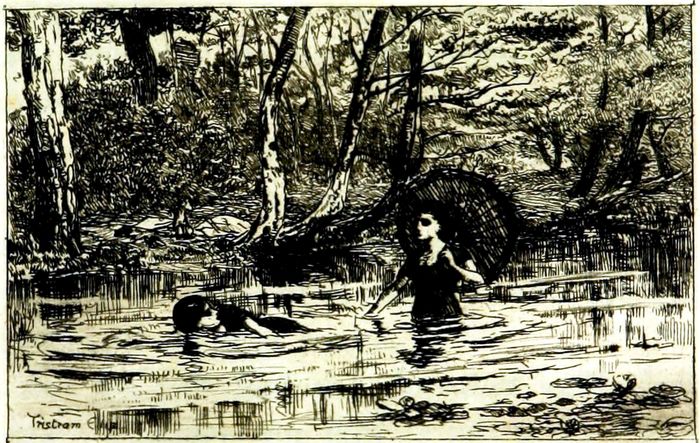
A hot Afternoon.
5The Soap-bath obtains a rapidly increasing number of adherents, and when once the habit of taking it is formed, it will not readily be abandoned, as it forms one of the pleasures, if not the pleasure of the day, and moreover, can be indulged in all the year round.
The fair sex will find the Soap-bath vastly superior to any cosmetic: it renders the skin as soft as an infant’s, and, with increased health, the complexion will appear more 6delicate and clear, tinged with a healthy colour beyond the power of art to produce.
It appears from the evidence obtained by modern scientific research, that hot water destroys the germinating power of malignant contagious diseases, and that soap chemically poisons it. These germs or spores are carried about by every wind that blows: and when it is borne in mind that, roughly speaking, a million of such germs will lie on a threepenny-piece; the value, as a preventive of contagion, of a thorough daily ablution with soap, may be estimated.
7The Romans, according to Pliny, raised the temperature of their air baths to almost boiling point, and they were apparently well acquainted with the grateful and invigorating after-application of cold water.
It is no slight recommendation of the Soap-bath, that while being an absolute luxury both for the feeble and robust, it cannot be resorted to as a mere indolent indulgence: the lungs and muscles are called into full action, a moderate though pleasant shock is encountered, and the bather has the satisfaction of knowing that all the pleasure and advantages gained are actually earned.
8The application of the Soap-bath is very simple: the bather is armed with a large lump of good ordinary yellow soap, and a loose washing glove (the white and very soft “Turkish” is the pleasantest, or if a hard glove be preferred, the “Baden” may be used) big enough to come over the wrist, and standing découvert in front of the washing basin containing hot water, quickly and vigorously covers the body from head to foot with a thick and abundant lather. By using hot water, chills are avoided, and the body is kept sufficiently warm to avoid the unpleasantness, and often harm, following repeated applications of mere handfuls of cold liquid.
9The soap application may take about three or four minutes at most; the very robust may use tepid water, but most persons will find warm or hot more agreeable; and more delicate persons whose finger-tips have the unpleasant habit of turning numb and white upon the application of cold water, will find in the Soap-bath an agreeable means of bathing otherwise perhaps unattainable.
Cold bathing promotes vigour in the young and healthy, and the Soap-bath has the same effect in an intensified degree, with the further inestimable advantage—except where there are positive indications of 10lung or heart disease—of being alike suitable to the robust and weakly.
With the body thoroughly warm comes the plunge into cold water, which must be got over quickly—once, twice, or thrice, overhead—but a couple of rapid dips are sufficient to remove every particle of soap.
A Plunge-bath sunk below the surface of the bath-room, lined with white glazed tiles, and nearly full of clear water, into which one can take a header, and clamber out by the aid of a rope and gently sloping ladder, is perhaps the best and most luxurious form; it is to be regretted that there are few such baths in modern houses.
11There are persons who habitually bathe in tepid water, and remain splashing about for a considerable time, but much greater benefit is to be derived, and the body becomes infinitely more refreshed and invigorated by a shorter immersion in water of a lower temperature.
The head must remain uncovered and receive the full benefit of the cold water. This may be a serious consideration for ladies, but there is no choice: the penalty for keeping the head dry will usually be a violent headache with the probable complaint that “baths don’t suit me,” but whether, in the absence of wetting the head, headache follows or not, the health must suffer.
12The momentary shock of the cold dip is succeeded by a delightful feeling of vital internal warmth—a delicious triumphant glow. It is highly unadvisable to be leisurely over this part of the bath, however one may dawdle in dressing: the coldness of the water would gain upon the warmth of the body, but without waiting for this, the bather at once quits the cold bath, and proceeds to make ample use of dry towels.
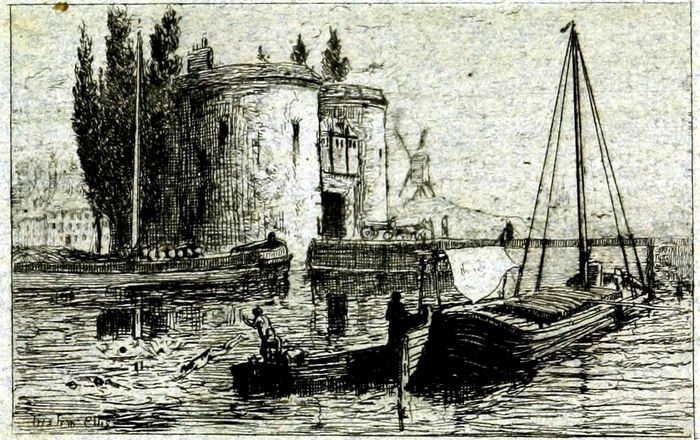
A Water-gate of Bruges.
13Some bathers with tough cuticles affect the use of towels bearing to the touch a strong resemblance to rasps or wire brushes, and affirm that everyone ought to use the very roughest that can be procured: there are others, on the contrary, possessing an outer epidermis so delicately soft and velvet-like, that very rough towels would, if used, cause insufferable agony, and almost flay them alive; what would be thought a rough towel by one, producing after use a full glow, would have no effect upon another.
The use of the flesh-brush, after a thorough rub down with towels, is to be commended for producing a more vigorous reaction; there are many persons, however, whose skins are too delicate to allow of the application of the flesh-brush, but this is of little moment, as a moderately 14rough towel will with them produce as strong a reaction, or as great a glow, as the flesh-brush would with those possessing less sensitive skins.

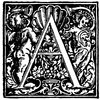
A Bath-Room, if possible should certainly receive the benefit of the sun, and in warm and genial weather the enjoyment of the bath will be heightened if the window be opened wide at the top.
When, however, the thermometer is in the neighbourhood of freezing point, the atmosphere of the bath-room is to many intolerably cold, and one may 16perhaps be sometimes tempted to raise the temperature of the cold water in the bath too high to produce the necessary shock with its pleasant and health-promoting reaction. It is better, by some means, in cold weather, to warm the bath-room and to keep the temperature of the cold water sufficiently low to produce the desired reaction. Drying and dressing may be comfortably gone through in front of a fire, the use of which for this purpose is a positive advantage, and will by no means, as might perhaps be imagined, tend to enervate or enfeeble, or in any way lessen the pleasure and benefits to be derived from the 17bath; a good fire on the contrary, will act as a help in laying in an agreeable and valuable supply of warmth, the advantage of which will be felt during the whole day.
Only a very weakly person should take the bath in the bed-room, as the air of the sleeping chamber must necessarily be more or less vitiated. Still, better there than not at all, and very likely, after a few trials, sufficient courage and energy will be found to enable the bather to get into fresher air.
The surface of the human body is protected by an oily film deposited by innumerable vessels, so that after a dip 18into water the skin is not thoroughly wetted, most of the water running from the body as from a duck’s back. After a Soap-bath, the bather will find himself thoroughly wet all over, the skin being apparently saturated as if it were blotting paper; both natural secretions and foreign matter will have yielded to the warm and cleansing bath of yellow soap and the after-application of cold water.
In conjunction with the Soap-bath, daily exercise after breakfast is not only desirable but necessary: half-an-hour’s ride, a brisk walk, or an open air game helps to circulate the blood and raise the spirits for the day. If the 19accumulated effects of three hundred and sixty-five morning walks could be seen and judged, perhaps business men would not be in quite so great a hurry, after bolting their breakfast, to rush into the omnibus or train. Half-an-hour apparently thus wasted is gained twice over during the day in better work more easily done.
A celebrated physician was once heard to say that he did not much care what atmosphere his patients lived in during the day so long as they breathed pure air at night; but whether one resides in town or country, it is impossible to breathe fresh air if the bed-room window be kept closed. 20Many people appear to be afraid of taking cold if they sleep with the bed-room window open: never was a greater mistake. The most delicately constituted maiden may, with ordinary precaution, and without the slightest fear of injury, sleep with the bed-room window open almost all the year round, and with the certainty of health and vigour being materially improved. Even this uncertain climate is seldom bad enough to compel complete closing up of the windows: the bed must of course not be placed in a direct draught: i.e. between the open window and the fireplace.
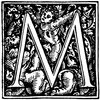
Many persons have to content themselves with a Sponge-bath, and although its invigorating effects are great, and cold water daily applied externally—no matter how—hardens the body, and keeps the system up to that high condition which makes the mere sense of living enjoyable, the application of cold water—sometimes nearly freezing—by fits and 22starts as it were, is not the most comfortable method of taking a bath, and the preference will generally be given to that which enables one to dip overhead at once.
However, after a long continued course of the Plunge, the Sponge-bath will sometimes be found a positive relief, and, like a change of food, will act as a whet to the appetite. In taking such a bath it is desirable that the sponge be of large size, and it should be placed in the bath, charged with water, ready for immediate use.
To obtain the fullest benefit in the most agreeable manner, the charged sponge, as the bather steps into the 23bath, should be lifted and carried quickly to the back of the head, which should be slightly inclined forward, so that the bulk of the water will run down the spine and back; the next spongeful should be almost instantaneously applied, leaning forward, to the top of the head, and the third, standing quite upright, to the chest; the arms and legs may then be separately treated: and if desire be felt for more, the application may be repeated to the back of the head and chest.
The species of cold bath following the hot is really of little moment, it is simply a matter of taste and convenience; 24and whether a plunge, shower, hip, sitz, or sponge-bath be used, the pleasurable and beneficial results will be very much the same.
There are bathers who prefer a Shower-bath, and, to those able to stand it, nothing can be more agreeable and refreshing, but it may be safely questioned whether a Shower-bath taken on a cold wintry morning, with the water all but freezing, can possibly prove salutary even to the most robust.
Nearly freezing water from a shower-bath produces a feeling something akin to what might be imagined to 25result from a shower of red-hot lead; the shock is tremendous, and the shower, if continued for any length of time, would assuredly cause asphyxia. Professor Jamin shews conclusively that although ice is always at an uniform temperature of 32°, water may remain liquid at a very much lower temperature if guarded from external disturbance.
The nerves must be thoroughly braced up to take such a bath: the writer has a lively recollection of stepping into a shower-bath one intensely cold morning, when, the string being pulled, not a drop of water descended; the connections were all frozen, and the bath was empty; the 26shock resulting on that occasion from the absence of the water, though of a negative and totally different description, was really greater than would have been produced by the cold shower itself.
The Shower-bath should be taken warmer than the ordinary cold bath; the water may be advantageously placed in the bath on the previous evening, and, if necessary, a little warm water added in the morning.
If headache follow, or reaction be slow, accompanied by shivering, the shower must be discontinued, and a milder bath resorted to.

Sea-bathing—at least in these islands—is generally believed in and largely practised, and some persons, by means of salts sold for that purpose, produce a close imitation of sea-water for their daily tubbing. A Salt-bath thus prepared, when its use conduces to the enjoyment and health of the bather, is by no means to be discouraged, 28and may advantageously follow the soap application in place of fresh water.
Most of us must have noticed how renovating to enfeebled constitutions is the effect of even a short course of sea-bathing, but it is equally patent that the good effects quickly wear off, the physique returning shortly to its perhaps normal condition of relaxation and lassitude. The daily use of the Soap-bath keeps the constitution permanently braced up to that delightful condition experienced by so few, that makes mere existence an absolute pleasure. A preliminary course of Sea-bathing 29is by no means necessary to bring about this pleasant condition of things.
Salt-water is more energetic in its action on the skin than fresh, and, after a dip in the sea, there is not the same liability to take cold from insufficient drying as after a fresh-water bath. Some bathers go so far as to habitually only half-dry themselves, the saline particles left on the skin further exciting its action, and producing a healthy and more vigorous glow. Children at the sea-side may safely be allowed, without the slightest fear of taking cold, to dabble and patter about in the little pools left by the 30receding tide: their constitutions will be positively invigorated and improved.
A love of cold-water bathing can perhaps be carried to excess, as in the case of those self-devoted Spartan swimmers, who, every morning, even in winter, assemble on the banks of the Serpentine, and audaciously defying their own instinct, plunge into the freezing water, even though they have first to break through the icy covering under which it is concealed by nature: the strongest constitution must suffer sooner or later from this treatment.
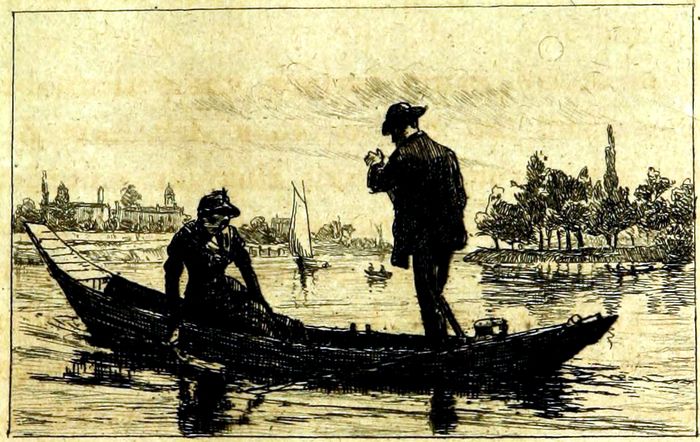
Taking the Plunge.
31Boys and girls ought to be taught swimming at school as they are taught gymnastics and calisthenics—as a matter of course. We ought, as islanders, to be swimmers, and it is to be regretted that we are not: swimmers are of necessity bathers, but bathers are not always, as they should be, swimmers. The percentage of swimmers in this country is perhaps considerably less than might be expected by those who have not given any thought to the subject, and yet the art itself is a necessary one, easy to acquire, healthy, and sometimes of the greatest possible service.
When once learned the action of swimming comes as 32naturally as walking, and doubtless man in a state of nature, would, like a dog, swim at once if thrown into the water. Swimming is an art which seems to incorporate itself into the physique, and become part of one’s being—at any rate, it can never be forgotten, and a person finding himself unexpectedly in deep water, after a twenty years’ rest from swimming, will strike out as naturally and surely, and with little more effort, than if the practice had never been given up.
Rowing-men are usually swimmers, or they ought to be. To appreciate river life one must go to bed early and 33get up early; ten o’clock should be the latest hour at which to turn in, but after an extra hard day’s pull the sheets will be welcome by nine. To enjoy thorough fatigue one must do a hard day’s work in the open air. Up in the morning betimes, garments hastily donned, a sharp pull to the nearest bathing place, where one can dive in and have a few minutes delicious swim, and back to breakfast—and such a breakfast! Or possibly the way lies through the fields where the grass is knee-deep and saturated with refreshing dew: then off come shoes and socks, the trousers are well tucked-up, and one gets what a hydropath would 34possibly term a leg-bath—in reality a delicious, fragrant dew-bath, which, though more than cool, is mightily enjoyable and never seems to give cold.
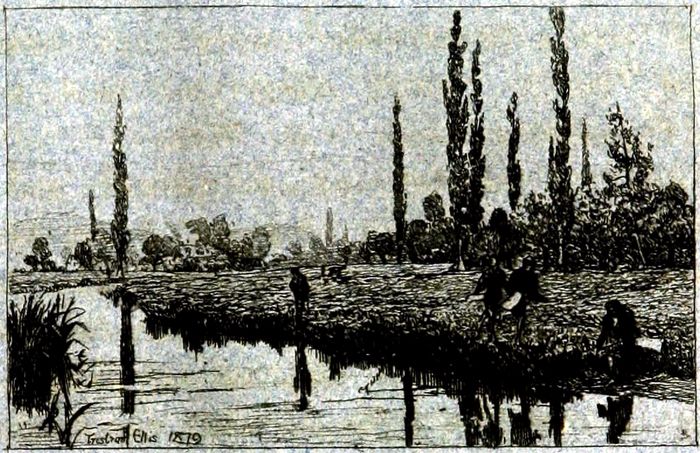
The dew-bath.
35Small-boned and fleshy persons naturally make the best swimmers, but it must not be supposed that thin people cannot learn to swim, and swim well. The writer well remembers seeing one morning at Brill’s swimming baths, Brighton, a young fellow who had just stepped from his dressing-box ready for a plunge. He was standing where the water is deepest, and judging by his appearance he literally could not have had an ounce of flesh to spare. It was absurd to suppose that so thin a man could swim, and his movements were curiously watched. After hesitating an instant, apparently measuring the size of the bath, he shot into the water head first as if propelled from a catapult, and shortly reappeared half-way across the bath, having swum the distance under water; he proved himself a thorough master of the element. It appeared that although passionately fond of the water he could only keep himself afloat by constant muscular exertion of both arms and legs; he was too thin to float naturally, and could not venture to swim out a greater distance than he felt sure of covering on his return.
36Tuition in swimming has been for some time past, and is now, given gratuitously in town by the London Swimming Club, from the persevering and enthusiastic Honorary Secretary of which—Mr. J. Garrett Elliott, 14, Finsbury Square—particulars may be obtained.
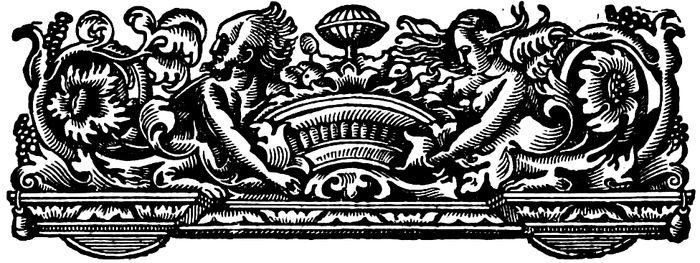
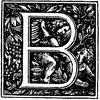
Bathing after hard exercise must be indulged in judiciously: a bath after a day’s shooting or cricketing, or an afternoon at lawn-tennis—to an enthusiast, who really plays, by far the hardest and most tiring form of amusement of the three—is pleasant and invigorating, and better understood than when it was an article of faith that to plunge into 38cold water, when heated, was almost equivalent to committing suicide.
Our grandmothers who adopted this view, were not like some of the present generation of girls educated at Girton and Zurich, or they might have called to mind Homer’s graphic description of the nocturnal expedition of Ulysses and Diomede to the Trojan camp, and their refreshing plunge into the sea when they returned reeking with heat and moisture from their successful raid; certainly none need fear to follow the example of such an old soldier as the cautious Ithacan.
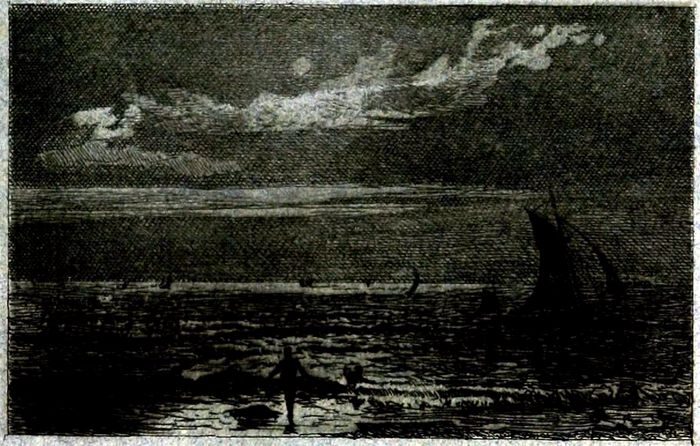
A Midsummer Night’s dip.
39A plunge into cold water when one is warm from exercise is intensely grateful, and may be indulged in with impunity even when much heated, provided the plunge be taken the moment the clothes are removed; the danger is in standing about on the brink, during which time the body rapidly cools, and cold may be taken.
Although perfectly safe to plunge into cold water, no matter how much the body may be heated, care must be taken to avoid it if there are feelings of lassitude and exhaustion; these are sure signs of over fatigue, and a cold bath under such circumstances is not only weakening, but 40might prove absolutely dangerous. A complete change of clothing must be ready, both for comfort, and to prevent any chance of taking cold through putting on clothes rendered damp by previous exercise.
The morning-bath forms a tolerably sure index as to the manner in which the previous evening has been spent. Morning exhaustion, and antipathy to cold water, may follow after an evening’s dancing with its attendant late hours, and nature will probably protest against too great a shock: it will be advisable to take the cold bath from five to ten degrees warmer than usual, or it may be deferred two or three hours.
41The much vexed question as to the advisability of continuing the bath through a severe and prolonged, or even an ordinary winter, must be left open, as it is not only unadvisable but absolutely impossible to lay down fixed rules. Each bather must be guided entirely by his own state of health and sense of vitality.
Even among the well-to-do, the bath is by no means so universal or so well appreciated as might be desired, the daily thorough ablution being looked upon by too many as a necessarily unpleasant process to be shunned or superficially hurried through, with no enjoyment and little 42advantage: thorough ablution in the form of the Soap-bath is an absolute luxury, and moreover is followed by an immediate increase of health, strength and mental vigour.
The primary object of taking a bath is cleanliness, and it is now better understood that the mere application of cold water to the skin does not cleanse, but merely closes the pores, the after vigorous use of towels doing so still further by rubbing in the impurities and natural secretions of the skin.
Cleanliness in connection with the bath should be strictly enforced: it should be cleaned and dried daily and 43occasionally scrubbed, and the washing glove well rinsed after use.
The delicately-soft skin of Egyptian women is said to be produced by the habitual use of the loofah, a fibrous flesh-glove woven by Dame Nature, the use of which is to be commended for finally cleansing the skin after the soap application with the ordinary washing glove. The loofah not only readily removes every particle of soap, but acts as a mildly invigorating flesh-glove, increases the suppleness of the skin in a marked degree, and moreover possesses the happy faculty of completely rinsing itself the moment it is 44dipped into water. Some persons discard the washing glove altogether, and use a loofah for applying the soap to the body: loofahs are of different degrees of texture, and when thus used, a fine close quality should be selected.
The sponge after use should be dipped in clean water and pressed out—not wrung, which tends to tear it—as nearly dry as possible: if habitually left charged with water, or—as sometimes done with a vague idea of sweetening—put out wet in the sun to dry, it will not only rot quickly but probably smell offensively, and even become unpleasant to the touch. To restore its sweetness, the sponge should 45be placed for a day or so in a basin of water in which a large piece of washing soda has been dissolved: the water should be changed once or twice, or oftener if necessary, and the sponge well squeezed out each time.
A word about the soap:—the best, perhaps, is that known as “John Knight’s Primrose,” an ordinary yellow soap, sweet and sound, and apparently containing none of the foreign matter sometimes found in soaps of a commoner and cheaper description. Scented soap must be avoided, especially for using habitually and liberally over the whole body.
46Decidedly unpleasant feelings, in some cases amounting to a positive loathing, occasionally follow the preliminary wetting of the feet on stepping into cold water: it may be taken for granted that such antipathy is by no means imaginary, but simply nature’s protest. The use is recommended, in conjunction with the Sponge-bath, of a broad stool (heavily weighted at the bottom, to prevent risk of upsetting) covered loosely with carpet, and high enough to reach above the level of the water when placed in the middle of the bath: the piece of carpet may be dried each day after use; or a Sponge-bath may be readily constructed 47with a fixed raised centre of metal forming a portion of the bath, the bather standing as it were on an island: the feet may thus at first be kept dry, and the preliminary shock received on the head and shoulders; persons who in despair had almost given up the Soap-bath, are by this means enabled to enjoy it without discomfort.
The temperature of the warm water with the soap application may vary from 75 to 95, or even 100°; it ought to be hot enough for the bather to feel it thoroughly grateful and comforting. The cold may vary from 30 to 70°, and it may be borne in mind that as great a shock will 48be produced with the higher temperature on an enfeebled or weakly constitution, as with the lower on a strong and robust: the bather must be guided by his own feelings. As a rough guide for those in moderate health, 90° for the warm and 60° for the cold may be taken as convenient.
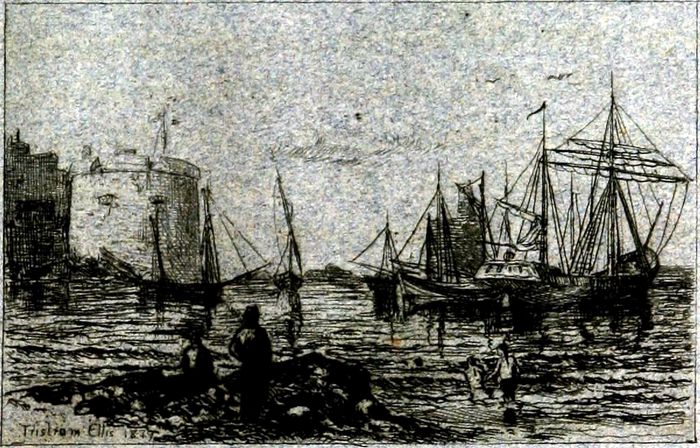
Cyprus—ware sharks.
49The necessity of getting quickly over the second or cold application must be strongly urged: in and out again must be the rule and not the exception. Any one may observe what takes place when the body is immersed in cold water: first comes the sharp, half-pleasing, half-painful sensation of cold, almost immediately followed by a consciousness of internal warmth, the duration of which will be in proportion to the power of the organization to keep up this counteraction. The cold water slowly but surely absorbs and extracts the vital heat; if the bath be unduly prolonged, chilliness, shivering, numbness, and exhaustion follow, and although the unpleasant symptoms will probably shortly disappear, the bather will have lost rather than gained in point of health.
No notion of “getting used to it,” or of cultivating hardiness and endurance, should induce one to venture near the stage commencing with chilliness; by so doing the 50stock of health is wasted instead of increased: the mere patient endurance of cold cannot possibly do good, although it may unquestionably do a great deal of harm.
Many persons suffer severely in winter from cold feet, with the attendant penalties of chilblains, colds, sore throat, and personal discomfort. It is well known to medical men that, when the feet are cold, the system is far more readily accessible to the attacks of disease, and to keep them warm, more especially during the early hours of the morning and after the bath, is, with some persons, almost an impossibility. Singers—both amateur and professional—suffer, 51certainly in this climate, more or less severely from affections—difficult to guard against—of the throat, induced in the majority of cases by cold, which first attacks the extremities. In lately consulting Dr. Llewelyn Thomas, he suggested as a future safeguard the wearing of shoes or slippers (made by Whiteley, of Westbourne Grove) of a description calculated not only to retain the natural heat of the body but to absolutely exclude cold and draughts. The material is a dark felt, lined with thick white fur; the shoes are open down the sides, but the openings are heavily covered with a dark fur, effectually excluding 52draughts. There are no laces or fastenings of any kind, and the shoes are slipped on or off in a moment.
It need not be imagined that because the daily application of cold water in the luxurious form of the Soap-bath be strongly urged, it is desirable to inure the body in the manner advocated at the early part of this century, when bare-kneed little children—robust or weakly—were exposed insufficiently clothed to the inclemency of the weather under the mistaken idea of hardening them—hardening some, no doubt, but killing a great many more. The power to resist cold means the power to resist disease, and to be 53proof against intense cold, one must not only be well fed, and warmly clad, but thoroughly warm before exposure to the cold atmosphere out of doors. Protected by sufficient clothing, the body acts as a sort of store-house of heat, and a sufficiently large stock of warmth absorbed in the morning will last all day, and fresh supplies will be drawn from the heat-producing food consumed. A shivering child sent out of doors for violent exercise may certainly get warm, but it does so at the expense of its own vital energy.
The essential that must not only be looked for, but positively and rapidly attained, is the reaction from the 54shock produced by the cold water: the heart is actively excited, and the blood propelled with unusual force through the system; the temperature of the body rapidly rises, and a general glow supervenes, accompanied with mixed feelings of increased vitality, buoyancy and exhilaration, difficult to describe. With the non-robust the stay in the cold water can hardly be made too short: the principal shock is produced from the first application, and the endeavour ought rather to be to get out as quickly as possible, than to stay in under the mistaken notion of deriving increased benefit.
Should the stay be even a trifle too prolonged, the 55reaction will be proportionately slow, and by no means so pleasant; or proper reaction may be made almost impossible, with the result of coldness, shivering, violent headache, slow pulse and probable sickness. It must, however, never be lost sight of that these unpleasantnesses are absolutely under the control of the bather, and never arise except with the very ignorant or very foolish: speedy reaction must be attained and can invariably be secured, even by the most feeble, provided the unpardonable and suicidal sin of too long a stay in the cold water be avoided.
Should the reaction after a Sponge-bath be very slow, it 56may be hastened by the previous addition to the water of a small wine-glassful of eau-de-cologne, spirits of wine, or spirits of any description, whiskey being perhaps best.
The Soap-bath may be commenced at any period of the year, and if children are induced to take it as a treat, rather than from any other point of view, they will soon become as partial to its use as their elders.
In slight colds the bath may be continued, but in the rare case of an extremely violent one, or affection of the throat, the bather, however much against his will, must perforce give it up for a time.
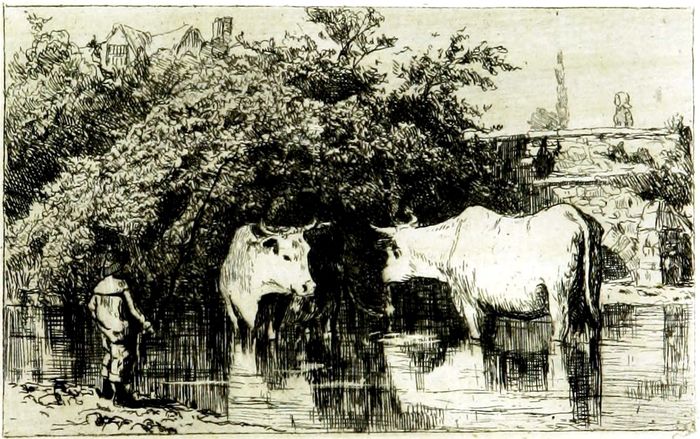
Taking the waters.
57Those who habituate themselves to the indulgence of the Soap-bath become, as it were, case-hardened, and can seldom be persuaded to forego their daily pleasure, much less to abandon the habit: by its use the body arrives and remains at its highest state of physical vigour; the power of resisting sudden changes of temperature is greatly increased, and liability to colds correspondingly lessened, while there is an almost absolute freedom from danger of infection and epidemic attacks. The Soap-bath is a source of immense and constant physical gratification; food is keenly enjoyed, the muscles get hard and firm, and the 58skin soft as satin, while vigorous health and feelings of mental and animal enjoyment are produced attainable perhaps by no other means. Existence becomes what it was intended, and what it certainly ought to be—a positive pleasure: the numerous unpleasantnesses and dyspeptic ailments incidental to a low state of bodily health glide into the past, and their very recollection almost disappears.

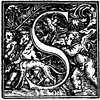
Since going to press the author’s attention has been drawn—not over-courteously perhaps—by certain manufacturers to the sweeping denunciation in this Sketch of the habitual use of scented soaps; but after a careful examination and trial of various kinds, one alone—known as Pears’ transparent soap—may in his opinion be safely indicated as a pure detergent in every way suitable for Luxurious Bathing.
End of the Project Gutenberg EBook of Luxurious Bathing, by Andrew W. Tuer
*** END OF THIS PROJECT GUTENBERG EBOOK LUXURIOUS BATHING ***
***** This file should be named 62531-h.htm or 62531-h.zip *****
This and all associated files of various formats will be found in:
http://www.gutenberg.org/6/2/5/3/62531/
Produced by Richard Tonsing, Chris Curnow, and the Online
Distributed Proofreading Team at https://www.pgdp.net (This
file was produced from images generously made available
by The Internet Archive)
Updated editions will replace the previous one--the old editions will
be renamed.
Creating the works from print editions not protected by U.S. copyright
law means that no one owns a United States copyright in these works,
so the Foundation (and you!) can copy and distribute it in the United
States without permission and without paying copyright
royalties. Special rules, set forth in the General Terms of Use part
of this license, apply to copying and distributing Project
Gutenberg-tm electronic works to protect the PROJECT GUTENBERG-tm
concept and trademark. Project Gutenberg is a registered trademark,
and may not be used if you charge for the eBooks, unless you receive
specific permission. If you do not charge anything for copies of this
eBook, complying with the rules is very easy. You may use this eBook
for nearly any purpose such as creation of derivative works, reports,
performances and research. They may be modified and printed and given
away--you may do practically ANYTHING in the United States with eBooks
not protected by U.S. copyright law. Redistribution is subject to the
trademark license, especially commercial redistribution.
START: FULL LICENSE
THE FULL PROJECT GUTENBERG LICENSE
PLEASE READ THIS BEFORE YOU DISTRIBUTE OR USE THIS WORK
To protect the Project Gutenberg-tm mission of promoting the free
distribution of electronic works, by using or distributing this work
(or any other work associated in any way with the phrase "Project
Gutenberg"), you agree to comply with all the terms of the Full
Project Gutenberg-tm License available with this file or online at
www.gutenberg.org/license.
Section 1. General Terms of Use and Redistributing Project
Gutenberg-tm electronic works
1.A. By reading or using any part of this Project Gutenberg-tm
electronic work, you indicate that you have read, understand, agree to
and accept all the terms of this license and intellectual property
(trademark/copyright) agreement. If you do not agree to abide by all
the terms of this agreement, you must cease using and return or
destroy all copies of Project Gutenberg-tm electronic works in your
possession. If you paid a fee for obtaining a copy of or access to a
Project Gutenberg-tm electronic work and you do not agree to be bound
by the terms of this agreement, you may obtain a refund from the
person or entity to whom you paid the fee as set forth in paragraph
1.E.8.
1.B. "Project Gutenberg" is a registered trademark. It may only be
used on or associated in any way with an electronic work by people who
agree to be bound by the terms of this agreement. There are a few
things that you can do with most Project Gutenberg-tm electronic works
even without complying with the full terms of this agreement. See
paragraph 1.C below. There are a lot of things you can do with Project
Gutenberg-tm electronic works if you follow the terms of this
agreement and help preserve free future access to Project Gutenberg-tm
electronic works. See paragraph 1.E below.
1.C. The Project Gutenberg Literary Archive Foundation ("the
Foundation" or PGLAF), owns a compilation copyright in the collection
of Project Gutenberg-tm electronic works. Nearly all the individual
works in the collection are in the public domain in the United
States. If an individual work is unprotected by copyright law in the
United States and you are located in the United States, we do not
claim a right to prevent you from copying, distributing, performing,
displaying or creating derivative works based on the work as long as
all references to Project Gutenberg are removed. Of course, we hope
that you will support the Project Gutenberg-tm mission of promoting
free access to electronic works by freely sharing Project Gutenberg-tm
works in compliance with the terms of this agreement for keeping the
Project Gutenberg-tm name associated with the work. You can easily
comply with the terms of this agreement by keeping this work in the
same format with its attached full Project Gutenberg-tm License when
you share it without charge with others.
1.D. The copyright laws of the place where you are located also govern
what you can do with this work. Copyright laws in most countries are
in a constant state of change. If you are outside the United States,
check the laws of your country in addition to the terms of this
agreement before downloading, copying, displaying, performing,
distributing or creating derivative works based on this work or any
other Project Gutenberg-tm work. The Foundation makes no
representations concerning the copyright status of any work in any
country outside the United States.
1.E. Unless you have removed all references to Project Gutenberg:
1.E.1. The following sentence, with active links to, or other
immediate access to, the full Project Gutenberg-tm License must appear
prominently whenever any copy of a Project Gutenberg-tm work (any work
on which the phrase "Project Gutenberg" appears, or with which the
phrase "Project Gutenberg" is associated) is accessed, displayed,
performed, viewed, copied or distributed:
This eBook is for the use of anyone anywhere in the United States and
most other parts of the world at no cost and with almost no
restrictions whatsoever. You may copy it, give it away or re-use it
under the terms of the Project Gutenberg License included with this
eBook or online at www.gutenberg.org. If you are not located in the
United States, you'll have to check the laws of the country where you
are located before using this ebook.
1.E.2. If an individual Project Gutenberg-tm electronic work is
derived from texts not protected by U.S. copyright law (does not
contain a notice indicating that it is posted with permission of the
copyright holder), the work can be copied and distributed to anyone in
the United States without paying any fees or charges. If you are
redistributing or providing access to a work with the phrase "Project
Gutenberg" associated with or appearing on the work, you must comply
either with the requirements of paragraphs 1.E.1 through 1.E.7 or
obtain permission for the use of the work and the Project Gutenberg-tm
trademark as set forth in paragraphs 1.E.8 or 1.E.9.
1.E.3. If an individual Project Gutenberg-tm electronic work is posted
with the permission of the copyright holder, your use and distribution
must comply with both paragraphs 1.E.1 through 1.E.7 and any
additional terms imposed by the copyright holder. Additional terms
will be linked to the Project Gutenberg-tm License for all works
posted with the permission of the copyright holder found at the
beginning of this work.
1.E.4. Do not unlink or detach or remove the full Project Gutenberg-tm
License terms from this work, or any files containing a part of this
work or any other work associated with Project Gutenberg-tm.
1.E.5. Do not copy, display, perform, distribute or redistribute this
electronic work, or any part of this electronic work, without
prominently displaying the sentence set forth in paragraph 1.E.1 with
active links or immediate access to the full terms of the Project
Gutenberg-tm License.
1.E.6. You may convert to and distribute this work in any binary,
compressed, marked up, nonproprietary or proprietary form, including
any word processing or hypertext form. However, if you provide access
to or distribute copies of a Project Gutenberg-tm work in a format
other than "Plain Vanilla ASCII" or other format used in the official
version posted on the official Project Gutenberg-tm web site
(www.gutenberg.org), you must, at no additional cost, fee or expense
to the user, provide a copy, a means of exporting a copy, or a means
of obtaining a copy upon request, of the work in its original "Plain
Vanilla ASCII" or other form. Any alternate format must include the
full Project Gutenberg-tm License as specified in paragraph 1.E.1.
1.E.7. Do not charge a fee for access to, viewing, displaying,
performing, copying or distributing any Project Gutenberg-tm works
unless you comply with paragraph 1.E.8 or 1.E.9.
1.E.8. You may charge a reasonable fee for copies of or providing
access to or distributing Project Gutenberg-tm electronic works
provided that
* You pay a royalty fee of 20% of the gross profits you derive from
the use of Project Gutenberg-tm works calculated using the method
you already use to calculate your applicable taxes. The fee is owed
to the owner of the Project Gutenberg-tm trademark, but he has
agreed to donate royalties under this paragraph to the Project
Gutenberg Literary Archive Foundation. Royalty payments must be paid
within 60 days following each date on which you prepare (or are
legally required to prepare) your periodic tax returns. Royalty
payments should be clearly marked as such and sent to the Project
Gutenberg Literary Archive Foundation at the address specified in
Section 4, "Information about donations to the Project Gutenberg
Literary Archive Foundation."
* You provide a full refund of any money paid by a user who notifies
you in writing (or by e-mail) within 30 days of receipt that s/he
does not agree to the terms of the full Project Gutenberg-tm
License. You must require such a user to return or destroy all
copies of the works possessed in a physical medium and discontinue
all use of and all access to other copies of Project Gutenberg-tm
works.
* You provide, in accordance with paragraph 1.F.3, a full refund of
any money paid for a work or a replacement copy, if a defect in the
electronic work is discovered and reported to you within 90 days of
receipt of the work.
* You comply with all other terms of this agreement for free
distribution of Project Gutenberg-tm works.
1.E.9. If you wish to charge a fee or distribute a Project
Gutenberg-tm electronic work or group of works on different terms than
are set forth in this agreement, you must obtain permission in writing
from both the Project Gutenberg Literary Archive Foundation and The
Project Gutenberg Trademark LLC, the owner of the Project Gutenberg-tm
trademark. Contact the Foundation as set forth in Section 3 below.
1.F.
1.F.1. Project Gutenberg volunteers and employees expend considerable
effort to identify, do copyright research on, transcribe and proofread
works not protected by U.S. copyright law in creating the Project
Gutenberg-tm collection. Despite these efforts, Project Gutenberg-tm
electronic works, and the medium on which they may be stored, may
contain "Defects," such as, but not limited to, incomplete, inaccurate
or corrupt data, transcription errors, a copyright or other
intellectual property infringement, a defective or damaged disk or
other medium, a computer virus, or computer codes that damage or
cannot be read by your equipment.
1.F.2. LIMITED WARRANTY, DISCLAIMER OF DAMAGES - Except for the "Right
of Replacement or Refund" described in paragraph 1.F.3, the Project
Gutenberg Literary Archive Foundation, the owner of the Project
Gutenberg-tm trademark, and any other party distributing a Project
Gutenberg-tm electronic work under this agreement, disclaim all
liability to you for damages, costs and expenses, including legal
fees. YOU AGREE THAT YOU HAVE NO REMEDIES FOR NEGLIGENCE, STRICT
LIABILITY, BREACH OF WARRANTY OR BREACH OF CONTRACT EXCEPT THOSE
PROVIDED IN PARAGRAPH 1.F.3. YOU AGREE THAT THE FOUNDATION, THE
TRADEMARK OWNER, AND ANY DISTRIBUTOR UNDER THIS AGREEMENT WILL NOT BE
LIABLE TO YOU FOR ACTUAL, DIRECT, INDIRECT, CONSEQUENTIAL, PUNITIVE OR
INCIDENTAL DAMAGES EVEN IF YOU GIVE NOTICE OF THE POSSIBILITY OF SUCH
DAMAGE.
1.F.3. LIMITED RIGHT OF REPLACEMENT OR REFUND - If you discover a
defect in this electronic work within 90 days of receiving it, you can
receive a refund of the money (if any) you paid for it by sending a
written explanation to the person you received the work from. If you
received the work on a physical medium, you must return the medium
with your written explanation. The person or entity that provided you
with the defective work may elect to provide a replacement copy in
lieu of a refund. If you received the work electronically, the person
or entity providing it to you may choose to give you a second
opportunity to receive the work electronically in lieu of a refund. If
the second copy is also defective, you may demand a refund in writing
without further opportunities to fix the problem.
1.F.4. Except for the limited right of replacement or refund set forth
in paragraph 1.F.3, this work is provided to you 'AS-IS', WITH NO
OTHER WARRANTIES OF ANY KIND, EXPRESS OR IMPLIED, INCLUDING BUT NOT
LIMITED TO WARRANTIES OF MERCHANTABILITY OR FITNESS FOR ANY PURPOSE.
1.F.5. Some states do not allow disclaimers of certain implied
warranties or the exclusion or limitation of certain types of
damages. If any disclaimer or limitation set forth in this agreement
violates the law of the state applicable to this agreement, the
agreement shall be interpreted to make the maximum disclaimer or
limitation permitted by the applicable state law. The invalidity or
unenforceability of any provision of this agreement shall not void the
remaining provisions.
1.F.6. INDEMNITY - You agree to indemnify and hold the Foundation, the
trademark owner, any agent or employee of the Foundation, anyone
providing copies of Project Gutenberg-tm electronic works in
accordance with this agreement, and any volunteers associated with the
production, promotion and distribution of Project Gutenberg-tm
electronic works, harmless from all liability, costs and expenses,
including legal fees, that arise directly or indirectly from any of
the following which you do or cause to occur: (a) distribution of this
or any Project Gutenberg-tm work, (b) alteration, modification, or
additions or deletions to any Project Gutenberg-tm work, and (c) any
Defect you cause.
Section 2. Information about the Mission of Project Gutenberg-tm
Project Gutenberg-tm is synonymous with the free distribution of
electronic works in formats readable by the widest variety of
computers including obsolete, old, middle-aged and new computers. It
exists because of the efforts of hundreds of volunteers and donations
from people in all walks of life.
Volunteers and financial support to provide volunteers with the
assistance they need are critical to reaching Project Gutenberg-tm's
goals and ensuring that the Project Gutenberg-tm collection will
remain freely available for generations to come. In 2001, the Project
Gutenberg Literary Archive Foundation was created to provide a secure
and permanent future for Project Gutenberg-tm and future
generations. To learn more about the Project Gutenberg Literary
Archive Foundation and how your efforts and donations can help, see
Sections 3 and 4 and the Foundation information page at
www.gutenberg.org
Section 3. Information about the Project Gutenberg Literary Archive Foundation
The Project Gutenberg Literary Archive Foundation is a non profit
501(c)(3) educational corporation organized under the laws of the
state of Mississippi and granted tax exempt status by the Internal
Revenue Service. The Foundation's EIN or federal tax identification
number is 64-6221541. Contributions to the Project Gutenberg Literary
Archive Foundation are tax deductible to the full extent permitted by
U.S. federal laws and your state's laws.
The Foundation's principal office is in Fairbanks, Alaska, with the
mailing address: PO Box 750175, Fairbanks, AK 99775, but its
volunteers and employees are scattered throughout numerous
locations. Its business office is located at 809 North 1500 West, Salt
Lake City, UT 84116, (801) 596-1887. Email contact links and up to
date contact information can be found at the Foundation's web site and
official page at www.gutenberg.org/contact
For additional contact information:
Dr. Gregory B. Newby
Chief Executive and Director
[email protected]
Section 4. Information about Donations to the Project Gutenberg
Literary Archive Foundation
Project Gutenberg-tm depends upon and cannot survive without wide
spread public support and donations to carry out its mission of
increasing the number of public domain and licensed works that can be
freely distributed in machine readable form accessible by the widest
array of equipment including outdated equipment. Many small donations
($1 to $5,000) are particularly important to maintaining tax exempt
status with the IRS.
The Foundation is committed to complying with the laws regulating
charities and charitable donations in all 50 states of the United
States. Compliance requirements are not uniform and it takes a
considerable effort, much paperwork and many fees to meet and keep up
with these requirements. We do not solicit donations in locations
where we have not received written confirmation of compliance. To SEND
DONATIONS or determine the status of compliance for any particular
state visit www.gutenberg.org/donate
While we cannot and do not solicit contributions from states where we
have not met the solicitation requirements, we know of no prohibition
against accepting unsolicited donations from donors in such states who
approach us with offers to donate.
International donations are gratefully accepted, but we cannot make
any statements concerning tax treatment of donations received from
outside the United States. U.S. laws alone swamp our small staff.
Please check the Project Gutenberg Web pages for current donation
methods and addresses. Donations are accepted in a number of other
ways including checks, online payments and credit card donations. To
donate, please visit: www.gutenberg.org/donate
Section 5. General Information About Project Gutenberg-tm electronic works.
Professor Michael S. Hart was the originator of the Project
Gutenberg-tm concept of a library of electronic works that could be
freely shared with anyone. For forty years, he produced and
distributed Project Gutenberg-tm eBooks with only a loose network of
volunteer support.
Project Gutenberg-tm eBooks are often created from several printed
editions, all of which are confirmed as not protected by copyright in
the U.S. unless a copyright notice is included. Thus, we do not
necessarily keep eBooks in compliance with any particular paper
edition.
Most people start at our Web site which has the main PG search
facility: www.gutenberg.org
This Web site includes information about Project Gutenberg-tm,
including how to make donations to the Project Gutenberg Literary
Archive Foundation, how to help produce our new eBooks, and how to
subscribe to our email newsletter to hear about new eBooks.